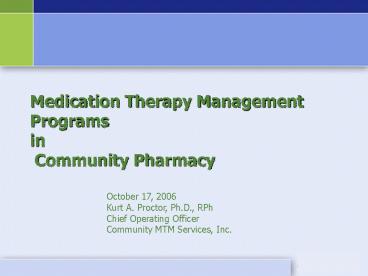Medication Therapy Management Programs - PowerPoint PPT Presentation
Title:
Medication Therapy Management Programs
Description:
Ensure optimum therapeutic outcomes for targeted beneficiaries through improved ... Pharmacist adoption and participation has been sporadic and underwhelming ... – PowerPoint PPT presentation
Number of Views:33
Avg rating:3.0/5.0
Title: Medication Therapy Management Programs
1
Medication Therapy Management Programs in
Community Pharmacy
October 17, 2006 Kurt A. Proctor, Ph.D.,
RPh Chief Operating Officer Community MTM
Services, Inc.
2
Medication Therapy Management
- Medication Therapy Management Programs (MTMP) are
designed to - Ensure optimum therapeutic outcomes for targeted
beneficiaries through improved medication use - Reduce the risk of adverse events
- Reduce drug-drug interactions
3
Pharmacys perspective on MTM Model Core Elements
- Advisory Panel Key MTM Model Concepts
- Applicable to all patients in need of MTM
services - Patient-centered empower patient to self-manage
medications - Importance of collaboration with physicians and
other health care providers - Facilitate continuity of care
- Able to be delivered by large numbers of
pharmacists - Distinct from dispensing
4
MTM Model Core Elements
- Medication Therapy Review (MTR)
- Personal Medication Record (PMR)
- Medication Action Plan (MAP)
- Intervention and/or referral
- Documentation and follow-up
5
MTM Model Core Elements Medication Therapy
Review
- Model core elements document advocates for
- Annual Comprehensive Medication Therapy Review
(MTR) designed to improve patients
self-management of medications - Targeted Medication Therapy Reviews (MTRs) to
address new medication problems or for medication
therapy monitoring follow-up
6
MTM Model Core Elements
- Personal Medication Record (PMR) patient
receives a PMR at the end of a comprehensive MTR - Medication Action Plan (MAP) patient-focused
document containing information the patient can
use to improve medication self-management
7
MTM Model Core Elements
- Intervention/referral pharmacist intervenes to
address medication-related problems or refers the
patient to the appropriate health care provider - Documentation/follow-up pharmacist documents
services in a manner appropriate for evaluating
patient progress and billing and schedules a
follow-up visit
8
Obstacles to Appropriate Use
- Treatment complexities
- Multiple medications
- Multiple prescribers
- Inappropriate prescribing
- Fragmented health care system
- Hospital reconciliation issues
- Aging patients / caregiver issues
9
Patients Forget
- Patients forget 80 of what their doctor tells
them - Nearly half of what they remember, they remember
incorrectly.
Source Journal of the Royal Society of Medicine,
news release, May 1, 2003
10
Pharmacists and MTM
- Face-to-face patient relationship
- Know and see more than claims history
- Higher patient acceptance
- Challenges
- Historical product-based reimbursement
- Happenstance approaches in a busy environment
- MTM part of a bigger paradigm shift
11
Pharmacy Committed to Changing the Paradigm
- A new model
- One that recognizes the value of the pharmacist
- One that aligns the interests of the plan,
patient, and the pharmacist - One that positions the pharmacist as the risk
manager and a true partner with the plan - One where a pharmacist-centric benefit model is
recognized for the value it brings to health care
12
Engaging Pharmacies for Services
- Many disparate programs exist and are emerging
without commonality or familiarity to pharmacists - Pharmacist adoption and participation has been
sporadic and underwhelming - Many program sponsors or potential sponsors dont
know how to reach a broad network of community
pharmacists - Difficult for pharmacies to implement dozens of
disparate programs using disparate systems
13
Pharmacy Services
- Expanding opportunities for services will
require - A systemized, structured sponsorpharmacist
communications system - Capacity for rapid adoption across the profession
- Policies and procedures to ensure levels of
service
14
Creating Opportunities
- A systemized, structured sponsorpharmacist
- communications system creates
- Opportunity for disparate program developers to
deliver their programs to pharmacies and get
broader adoption and execution - Opportunity for pharmacies to engage multiple
disparate programs efficiently and effectively
15
Programs Compete
- Programs retain their differentiation
- What pharmacists do
- Which patients are involved
- Information provided to pharmacists
- What pharmacists document
- How much pharmacies are paid
- Reports programs provide to sponsors
- Using a common method of communication
16
Programs
Adverse Events Tracking
Compliance, Persistence, Patient Ed
Clinical Trials/ Rx Alerts
Formulary Utilization Mgmt
Specialty Drug Services
MTM, Disease Mgmt
Benefit Counseling
17
Program Sponsors
Self Insured Employers
Pharma
Commercial Plans
CMS, FDA, CDC, States, etc.
PBMs
Content Developers
PDP MA-PD
Patients
18
Concept of a Common Framework for Multiple
Programs
This slide is for illustrative purposes only, the
companies and programs shown here are not
affiliated with Community MTM































